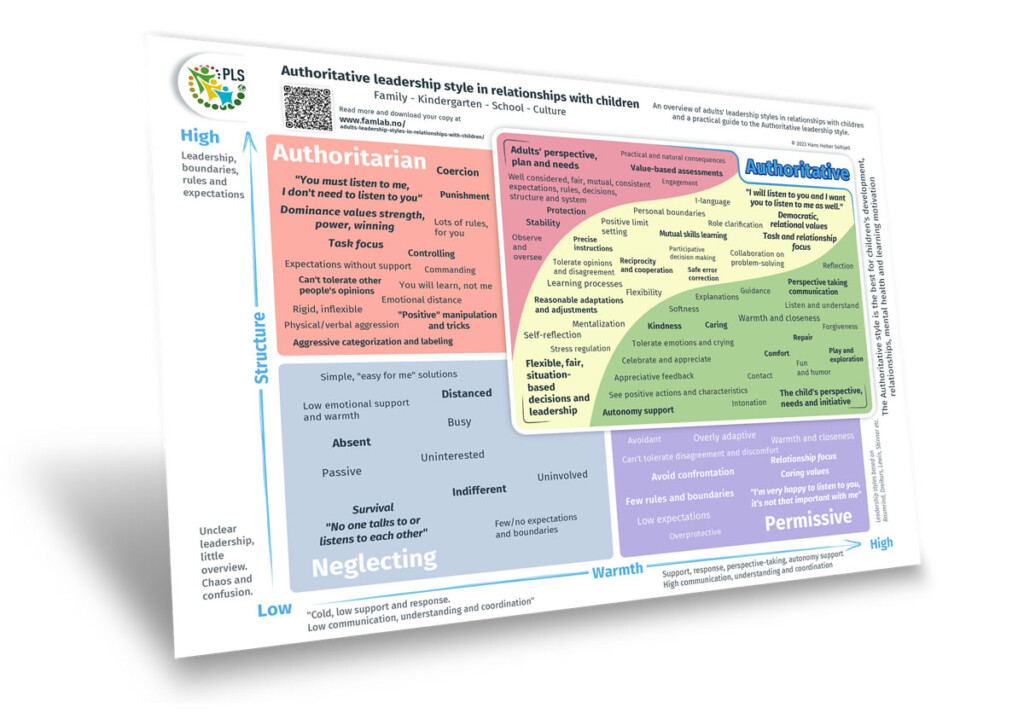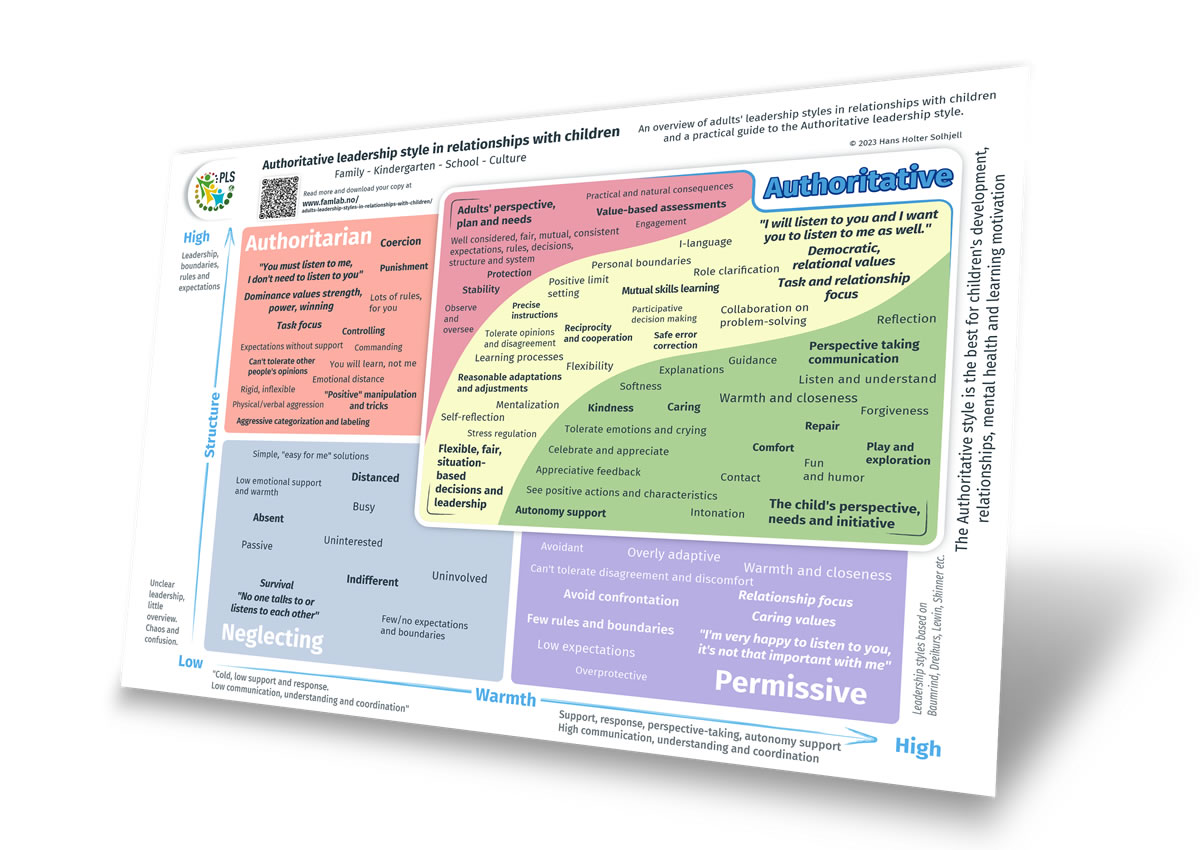The PLS Authoritative Leadership Style Model
– FAMILY – KINDERGARTEN – SCHOOL –
Adults’ leadership style in relationships with children affects children’s well-being, learning and development
Read about the PLS Authoritative Leadership Style Model in this article.
Here you can learn more about adults’ leadership styles in relationships with children, and about the PLS Authoritative Leadership Style Model.
The PLS Authoritative Leadership Style Model helps you get an overview of the different leadership and caregiver styles, and to get a practical understanding of what is needed to develop an Authoritative leadership and caregiver style.
You can see a picture of this model below, and also download a PDF file of this model here.
Which Adult Leadership Style do you have in relationships with children?
Download the poster and get an overview of the 4 leadership styles!
The poster has a particular focus on the Authoritative style. The Authoritative style is the recommended leadership style, and provides the best support for children’s development.
The poster is practically oriented, with a focus on the values, attitudes and skills of the Authoritative style.
Parenting styles and leadership styles in kindergarten and school
Adults have different ways of being in relationships with children. This applies to parents, but also adults in kindergartens and schools. In research and literature about parents, the different ways of being in the relationship with children are often called parenting styles. And one distinguishes between 4 different styles, Authoritative, Authoritarian, Permissive and Neglecting.
The same styles also appear in the research on relationships in kindergartens and schools, but are then called teacher styles, leadership styles, school styles, caregiver styles etc. Here I will further use the terms leadership, parenting or caregiver styles.
Research on caregiver styles
Wide international research from a diverse range of countries and cultures shows that the parenting style has something to say for the children’s well-being and development, social competence and friendships, quality of life, health habits, learning motivation and results in school, as well as physical and mental health. The same is found with regard to adults’ caregiver and leadership styles in kindergartens and schools.
Authoritative leadership style is best for children
The style that is best suited to support children’s well-being and development, both in families, kindergartens and schools, is the Authoritative style. The Authoritative style is characterized by a combination of a lot of warmth, support and care, as well as clear and reasonable rules, limits and expectations of the child, adapted to the child’s maturity level and the context. In the PLS Authoritative Leadership Style Model, you get an overview of the Authoritative style.
In families, the permissive style can also work quite well in terms of the child’s mental health, but it provides a lesser degree of coping experience and motivation for school and efforts there. In kindergartens and schools, research shows that only the Authoritative style works well.
The style we adults take on can be influenced by many factors, such as factors related to the situation, characteristics of the child, the culture we are in, society, the family or the organisation, our own personality, personal history and experiences growing up, etc.
Authoritative leadership style is learned, developed and maintained
An important factor is also our own conscious and active efforts at learning, and what we ourselves have done in a conscious way to learn something about and to develop our leadership and caregiver style. For the vast majority of people, an Authoritative leadership style is not something you just have, but something you have to learn, develop and maintain.
This applies especially in relationships and situations which most adults perceive as more demanding and challenging, where you yourself may be stressed, provoked or insecure. It is now easy to either act in the Authoritarian or the Permissive way, if you have not worked consciously to learn the Authoritative style.
The PLS Authoritative Leadership Style Model
The purpose of the PLS Authoritative Leadership Style Model is to help you get an overview of the different leadership styles, with a particular focus on providing a practical understanding of what it takes to learn, develop and maintain an Authoritative leadership style.
The PLS Authoritative Leadership Style Model is part of the PLS framework for Developmentally Supportive Communication and Conflict Resolution. The PLS framework has a broad knowledge base, which also includes the research and theories on parenting styles and adult leadership styles. An important aim of the PLS framework is to support adults in developing and learning the Authoritative style, especially with regard to the situations that can become difficult and challenging, and with the children that need more support from caregivers, even when we are challenged by the child’s behaviour.
There are many different visual models and layouts that provide general descriptions of parenting and leadership styles in relationships with children. The aim of the PLS Authoritative Leadership Style Model is to direct the focus towards the Authoritative style and to the values, attitudes and skills we adults need to realize this style in relationships with children.
If you want to take a closer look at this model, you can download a PDF file of the model here.
Do you want to learn more about the PLS Authoritative Leadership Style Model? There will soon be more information about the model and PLS Authoritative Leadership in the form of articles and courses. By downloading the model and registering for our newsletter, you will receive information when this is ready.
You can download a PDF file of the model here.

